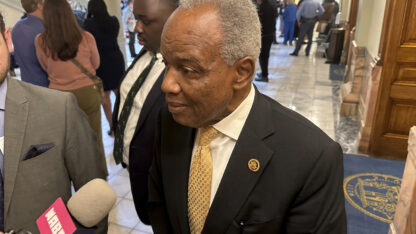This story is part of “Atlanta Remembers: The 1996 Olympics,” WABE’s series on the impact of the 1996 Summer Olympics on Atlanta, 20 years later. For more stories, click here.
When the Summer Olympics came to Atlanta 20 years ago, organizers had to build dozens of sporting venues from scratch.
The price tag was $1.7 billion. All the money was raised through private donations.
Two decades later, some venues are thriving, while others have languished.
Failure To Launch
The once-vibrant Olympic Tennis Stadium in Stone Mountain, where Andre Agassi and Lindsay Davenport won gold for the U.S. in ’96, now stands empty. The center courts are enclosed by a chain-link fence decorated with “no trespassing” signs.
Most of the surrounding practice courts are cracked and overgrown with weeds.
After the Olympics, the complex hosted a few tournaments, but they didn’t generate much revenue. The center is now managed by the Stone Mountain Memorial Association. There are no current plans for the complex, although there have been some offers.
“We probably have had eight or 10 proposals come our way from people who felt like they could get the thing going again,” says Bob Cowhig, director of planning and development for the SMMA. “And every time we got into it, there were just some financial issues we weren’t comfortable with.”
Cowhig says most offers didn’t have the financial backing they needed. He says the SMMA is still open to viable proposals.
Fulfilling The Dream
By contrast, just inside Stone Mountain Park sits another former venue. It’s now a well-maintained songbird habitat and hiking trail. The only clue that it was an Olympic venue is a plaque identifying it as the former site of the cycle track and archery competition.
After the Olympics, the fate of each venue varied. Management changed hands after the games.
“We did the planning,” says Dick Yarbrough, managing director for the 1996 Olympics. “The execution after the games was left up to the individual communities. Some did well; some didn’t.”
However, Yarbrough says Atlanta’s Olympic organizers took a unique approach to venue development.
“Our facilities were built for an afterlife and were retrofitted for the games, which is exactly the opposite [way] most Olympic planning is done,” he says.
The 1996 Olympics: Putting Atlanta On Global Stage
The most obvious example of that, he says, is Turner Field. The stadium was built for the Atlanta Braves, then retrofitted for track and field events and the opening and closing ceremonies. Now the Braves are moving to Cobb County, and Turner Field will go to Georgia State University.
Now, it’s part of the Campus Recreation Center at Georgia Tech.
“What really sets us apart from all of our competitors is we have 10 lanes; most pools only have eight,” says David Williams, Georgia Tech’s associate director of aquatics for campus recreation. “Our lanes are a little wider; the pool’s a little deeper. We’re 10.5 feet all the way through. And it’s hard to find a pool like that in this country.”
The $21 million facility stays busy. It hosts about 40 outside competitions a year.
“We’re built to international standards,” Williams says. “We’re not just built to U.S. standards, which is another reason why all the teams before the Olympics would want to come here because this is the exact same setup they’ll see in Rio.”
In fact, the 2016 U.S. Olympic swim team will practice at the pool this month before heading to Brazil for this year’s games. They’d planned to train in Puerto Rico, but changed course due to concerns about the Zika virus.
Williams says requests at the pool are nonstop.
“We get a lot — and I mean a lot — of visits from either cities that plan on bidding for an Olympics [or] cities that are planning on building big facilities,” he says. “I mean, we are the model to come to because we built for the future; we built to be sustainable; we’re doing more than we did originally, and we’re an economic driver for this area.”
Williams estimates the meets Georgia Tech hosts bring in roughly $15 million a year to the local economy, not including hotel stays.
The aquatic center has also helped the university expand some programs. For example, the recreation center has developed a robust SCUBA diving program. It also houses an outdoor center, where students can sign up for kayaking, camping and hiking trips or rent equipment on their own.
Lasting Legacies
Even though the 1996 Games were termed the “Atlanta Olympics,” events were held throughout Georgia. The rowing venue on Lake Lanier in Gainesville is now a rowing club. The Georgia International Horse Park in Conyers still hosts equestrian competitions — as well as concerts and festivals. The yachting venue built in Savannah is now a sailing center.
But, according to Yarbrough, the venue known as the capstone of the Atlanta Games is Centennial Olympic Park.
Thousands gather in the park for events throughout the year, including a July Fourth fireworks display. No sporting events took place there during the games, but it’s the only venue that kept ”Olympic” in its name.








